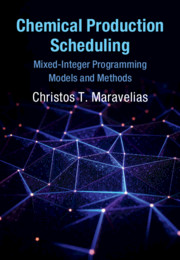Book contents
- Chemical Production Scheduling
- Cambridge Series in Chemical Engineering
- Chemical Production Scheduling
- Copyright page
- Dedication
- Contents
- Preface
- Part I Background
- Part II Basic Methods
- Part III Advanced Methods
- 8 Network Environment: Extensions
- 9 Continuous Processes
- 10 Periodic Scheduling
- 11 Multiperiod Blending
- Part IV Special Topics
- Index
- References
8 - Network Environment: Extensions
from Part III - Advanced Methods
Published online by Cambridge University Press: 01 May 2021
- Chemical Production Scheduling
- Cambridge Series in Chemical Engineering
- Chemical Production Scheduling
- Copyright page
- Dedication
- Contents
- Preface
- Part I Background
- Part II Basic Methods
- Part III Advanced Methods
- 8 Network Environment: Extensions
- 9 Continuous Processes
- 10 Periodic Scheduling
- 11 Multiperiod Blending
- Part IV Special Topics
- Index
- References
Summary
In this chapter, we discuss how to model additional processing features that may be present in a chemical facility. To keep the presentation simple, we illustrate how models based on a common discrete grid can be modified to account for these features. Continuous time models can also be extended to account for most of these features, but often lead to more complex and/or nonlinear formulations. We start, in Section 8.1, with the modeling of material consumption and production during the execution of a batch. In Section 8.2, we discuss the modeling of complex material storage and transfer activities. In Section 8.3, we present how to account for unit and task setups and task families. Finally, in Section 8.4, we present how to model unit deterioration and maintenance tasks.
Information
- Type
- Chapter
- Information
- Chemical Production SchedulingMixed-Integer Programming Models and Methods, pp. 193 - 215Publisher: Cambridge University PressPrint publication year: 2021
